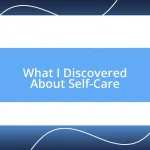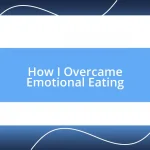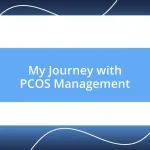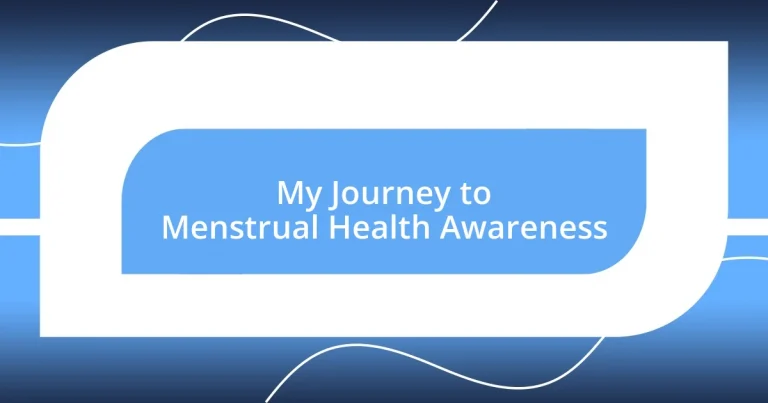Key takeaways:
- Open dialogue about menstrual health reduces stigma and fosters community support, highlighting the importance of shared experiences.
- Education on menstrual cycle phases and awareness of symptoms of menstrual disorders empower individuals to take control of their health.
- Utilizing natural remedies and sharing personal journeys enhance well-being and promote a sense of solidarity among those facing similar challenges.
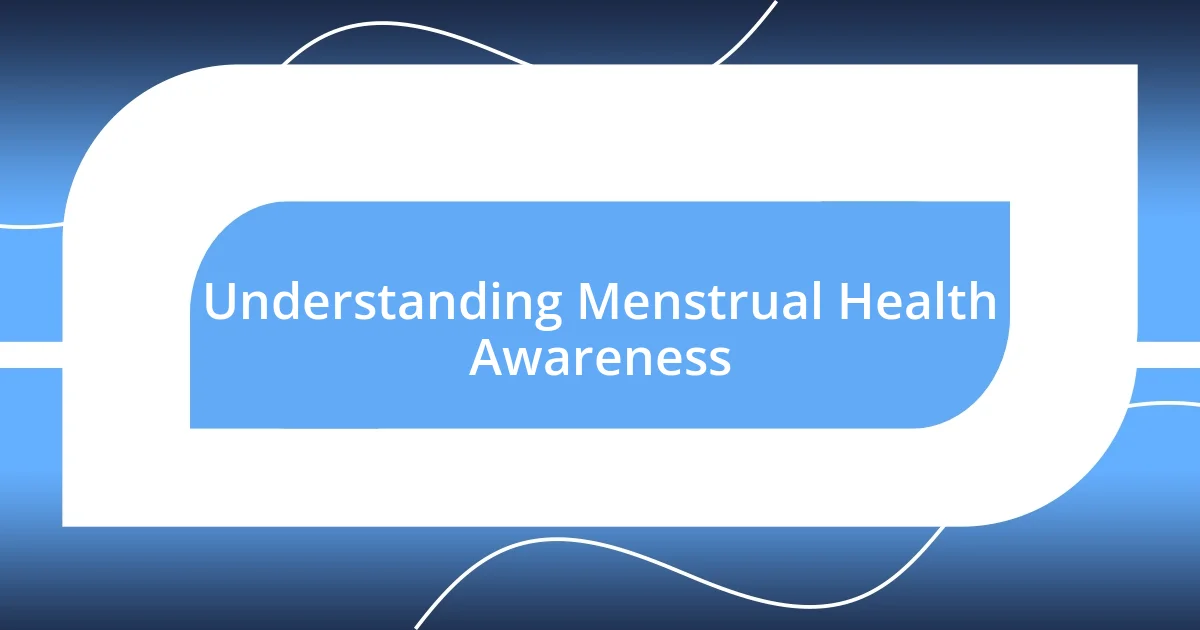
Understanding Menstrual Health Awareness
Menstrual health awareness goes beyond just understanding the biological processes; it encompasses the emotional and psychological well-being connected to menstruation as well. Reflecting on my own experiences, I can recall a time when I felt overwhelmed by societal taboos around periods. Have you ever felt hesitant to discuss your menstrual health openly? It struck me how vital open dialogue is for dismantling stigma and fostering a supportive community.
The reality is that many individuals still lack basic knowledge about menstrual health, which can lead to unnecessary anxiety and misinformation. I remember a friend who thought severe cramps were just a normal part of menstruation; it wasn’t until we talked that she learned about possible underlying conditions. Isn’t it alarming how much this lack of awareness can create emotional and physical stress?
Understanding menstrual health also involves recognizing the intersection of cultural norms and personal experiences. For instance, I’ve often found that different cultural backgrounds shape how people approach their periods. This realization made me wonder: how can we create more inclusive spaces that respect diverse experiences related to menstruation? It’s discussions like these that pave the way for greater awareness and understanding in our communities.
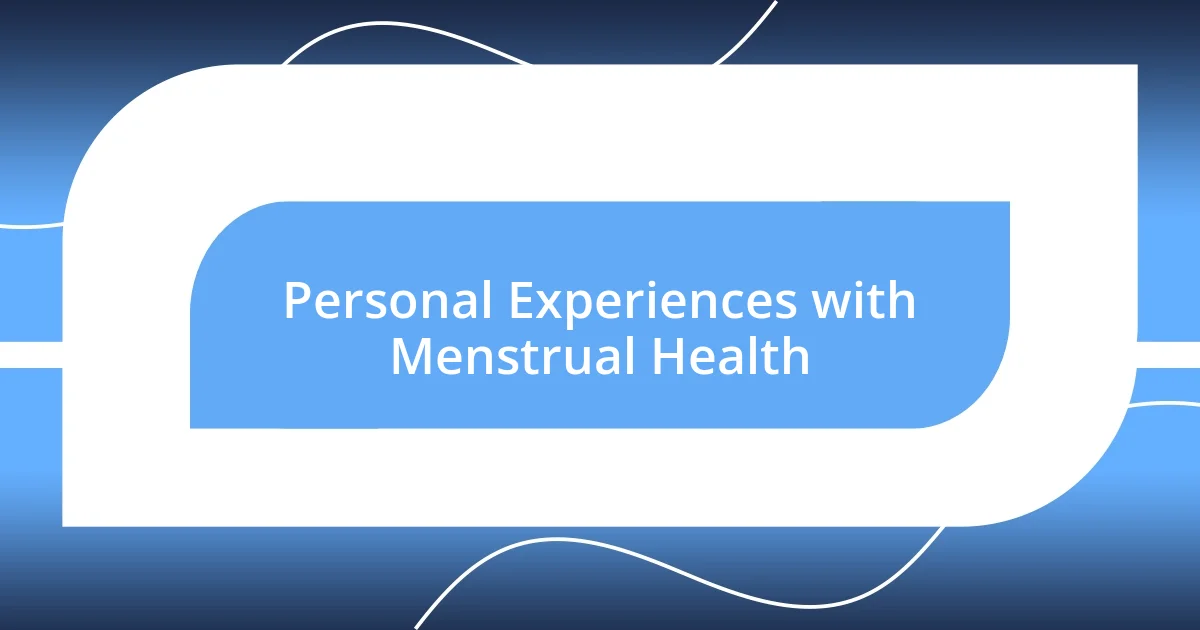
Personal Experiences with Menstrual Health
Reflecting on my journey with menstrual health, I vividly remember my first experience. I was about thirteen, scared and confused, navigating unpredictable cycles and overwhelming emotions. The lack of guidance during that time left me feeling isolated; I thought I was alone in dealing with the ups and downs of my body. Have you ever felt like no one truly understood what you were going through? Opening up to friends about my experiences helped me realize how many of us share similar stories, creating a sense of camaraderie and support.
As I matured, the emotional aspects of menstruation became more apparent. I frequently noticed how stress could impact my cycle, leading to late or heavy periods. Once, after a particularly stressful exam week, I was hit with debilitating cramps. I remember sitting on the bathroom floor, tears streaming down my face, wondering why no one had prepared me for this. These moments taught me that our mental well-being significantly influences our menstrual health, and it’s crucial to prioritize both.
One of the most eye-opening experiences for me was learning about the menstrual products available. Initially, I relied on conventional pads, but after experiencing discomfort, I decided to try menstrual cups. The transition was challenging, but I felt empowered by my choice. It made me reflect on how important it is to educate ourselves about our options, helping us take control of our health. Have you explored alternatives? Each personal journey is unique, and sharing these choices fosters a more open conversation about menstrual health.
| Experience | Lesson Learned |
|---|---|
| First Menstrual Cycle | Importance of sharing experiences |
| Effects of Stress on Cycle | Connecting mental health with menstruation |
| Transition to Menstrual Cup | Empowerment through education |
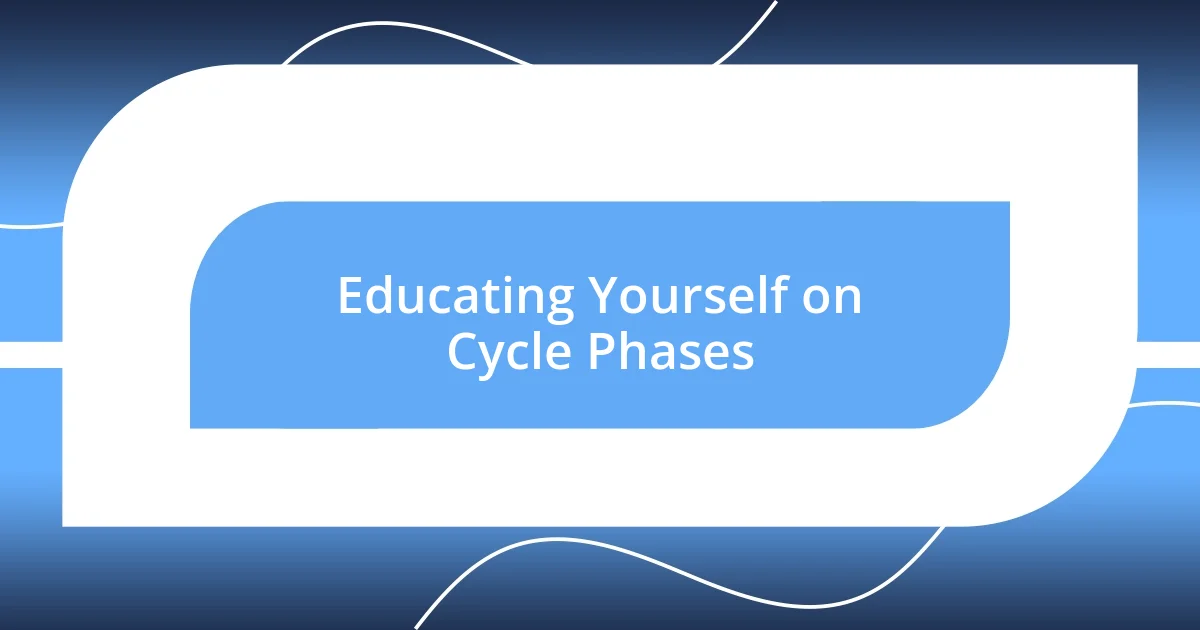
Educating Yourself on Cycle Phases
Educating yourself on the different phases of your menstrual cycle can profoundly impact how you understand your body and manage your health. I remember the first time I learned about the four main phases: menstrual, follicular, ovulatory, and luteal. Each phase brought distinct hormonal changes that influenced my physical and emotional state. Understanding these nuances helped me predict when I might feel energetic or when I needed some extra self-care. Have you ever taken note of how your mood fluctuates during your cycle? It’s fascinating to see that connection.
- Menstrual Phase: The shedding of the uterine lining; it’s a time of introspection and rest.
- Follicular Phase: Hormones start to rise, ushering in energy and motivation; it’s perfect for tackling projects.
- Ovulatory Phase: Peak fertility and confidence; I often feel my best during this time, eager to socialize and take on new challenges.
- Luteal Phase: A dip in energy can occur; understanding this helped me prepare for mood swings and cravings, reminding me to avoid overcommitting.
When I first started tracking my cycle, I used a simple app, and it transformed my understanding. I began recognizing patterns, like how my best workouts often coincided with my follicular phase. This knowledge not only boosted my confidence but also kept me motivated. It really painted a vivid picture of how interconnected our body’s rhythms are. Have you found tools or routines that help you stay in tune with your cycle?
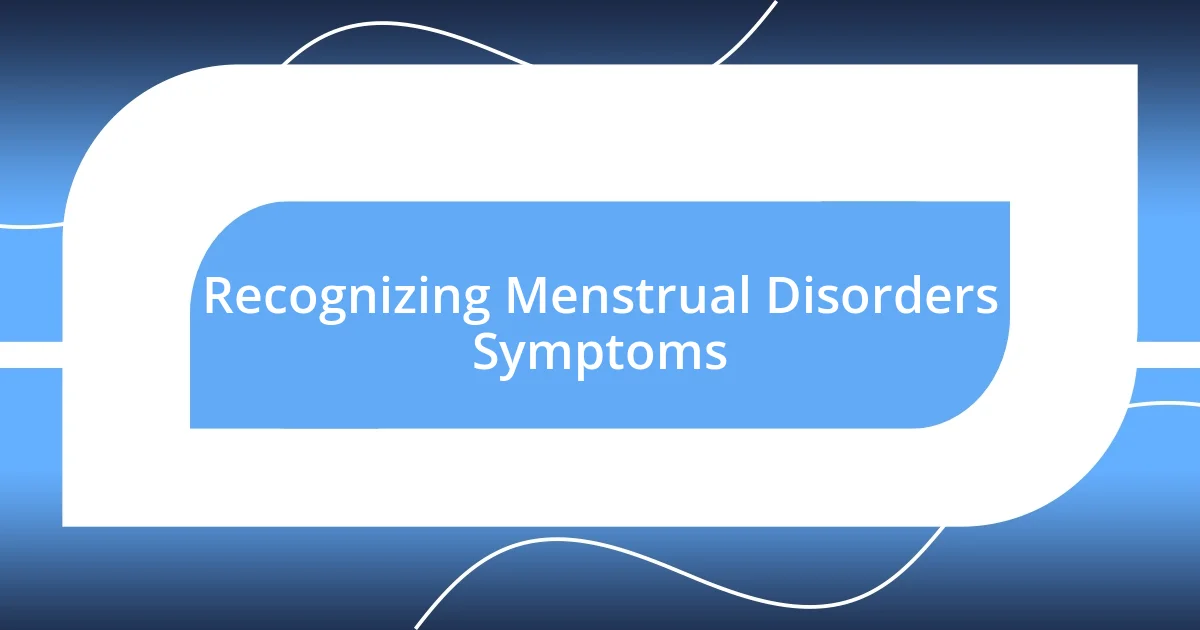
Recognizing Menstrual Disorders Symptoms
While it’s essential to embrace each phase of our menstrual cycle, recognizing symptoms of potential menstrual disorders is equally crucial. I remember one month when I experienced excessive bleeding that left me feeling drained and anxious. It was alarming, especially since I’d never faced such a situation before. Have you ever suddenly felt like your menstrual patterns just didn’t seem right? Frequently needing to change your pad or tampon every hour can be a sign that something is off, and it’s essential to listen to those signals.
Another symptom that often went unnoticed in my journey was the severity of cramps. Initially, I thought it was just something every woman experienced, but as I began to communicate with friends, I discovered that their discomfort was nowhere near mine. I vividly recall one particularly painful cycle where I was unable to go to work, curled up in bed, overwhelmed by the intensity. If something feels different, like headaches or persistent nausea that disrupt your daily life, take note. These could point to underlying disorders such as endometriosis or fibroids.
Lastly, emotional symptoms shouldn’t be overlooked either. I vividly recall feeling an overwhelming sense of despair during one luteal phase, which left me questioning everything from my relationships to my career path. Understanding that extreme mood swings or shifts in emotions might emerge from hormonal imbalances led me to seek professional help. Do you often feel like your emotions hijack your daily life? It’s vital to recognize that hormonal fluctuations can have profound effects on your mental well-being, making awareness and action even more important.
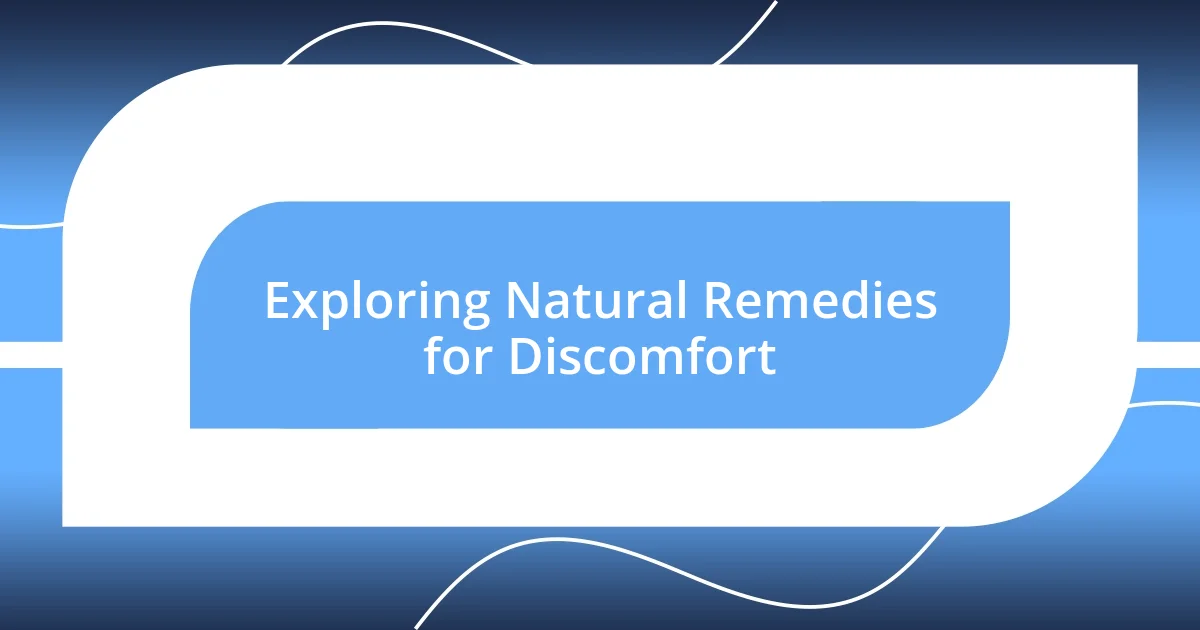
Exploring Natural Remedies for Discomfort
Natural remedies have been a game changer for me when tackling menstrual discomfort. I vividly remember the first time I tried a warm herbal tea blend during my period. The soothing warmth wrapped around me like a comforting embrace, easing those bothersome cramps while inviting a moment of relaxation. Have you ever experienced the calming effect of something simple like herbal tea? It’s a little ritual that turned out to be quite effective for me.
Incorporating essential oils into my self-care routine has also proven invaluable. I discovered that massaging a diluted blend of lavender and peppermint oil into my lower abdomen not only alleviated cramps but also brought a sense of tranquility. The aroma transported me to a serene place, easing both my physical and emotional tension. Do you have go-to scents that lift your spirits or calm your nerves? It’s fascinating how our senses play such a significant role in our comfort during these times.
Additionally, I started practicing gentle yoga poses specifically for menstrual relief. One evening, while attempting a simplechild’s pose, I felt a wave of relief wash over me. It was a blend of physical release and emotional grounding that I didn’t know I needed at that moment. Have you ever practiced yoga with specific intentions? These gentle routines helped me connect with my body, fostering a sense of peace rather than distress during my cycle. Embracing natural remedies has truly enriched my journey toward menstrual health awareness.
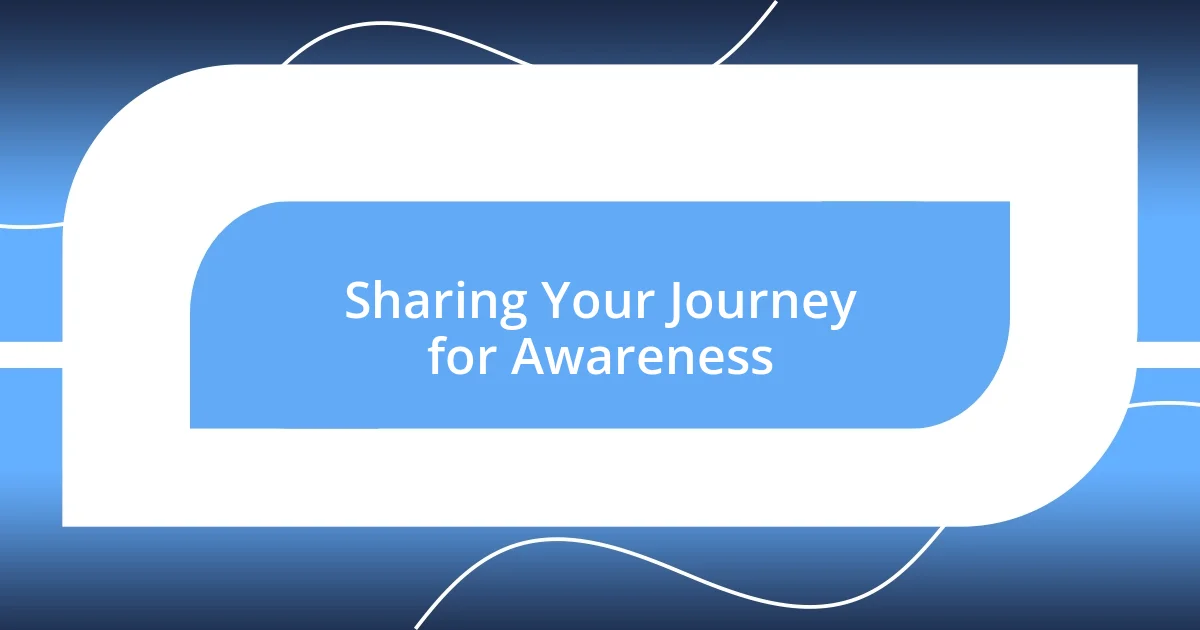
Sharing Your Journey for Awareness
Sharing my journey has been incredibly empowering, not only for myself but also for those around me. I remember sharing my story about battling severe PMS on social media. The response was overwhelming! So many women reached out to share their struggles and triumphs, and it felt like we created a safe space to discuss something often considered taboo. Have you ever felt that sense of community when sharing your own experiences?
I’ve found that even small moments can spark broader conversations. For instance, I once casually mentioned to a colleague how a specific diet change significantly improved my symptoms. She leaned in, intrigued, and before I knew it, we were deep in conversation about menstrual health and wellness. It’s amazing how opening up can lead to valuable exchanges and even solutions that we might not have considered before. Have you had moments when talking about your journey opened new doors for understanding?
Empowering others through our experiences can make an undeniable impact. One day, I attended a supportive workshop led by a woman who bravely shared her struggles with endometriosis. Her authenticity resonated deeply with me, inspiring me to embrace my own story with vulnerability. When we share our journeys, we not only raise awareness but also forge connections that remind us we’re not alone, and that’s a crucial step toward healing. Isn’t it incredible how our voices can unify us in this journey?





